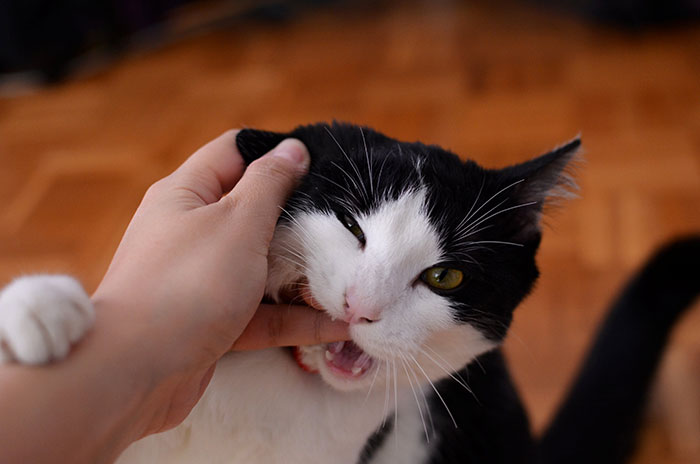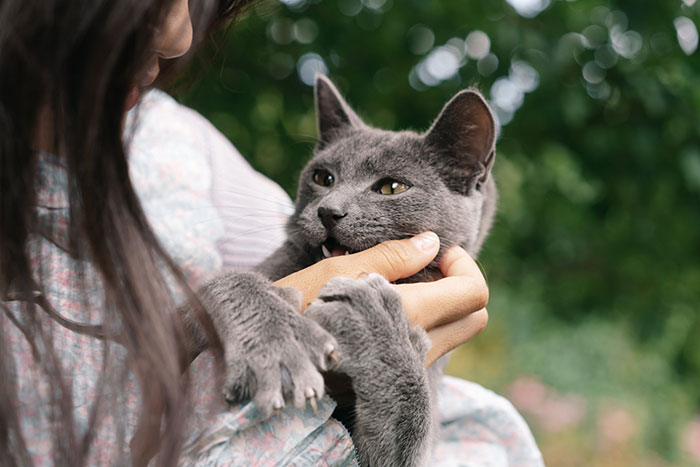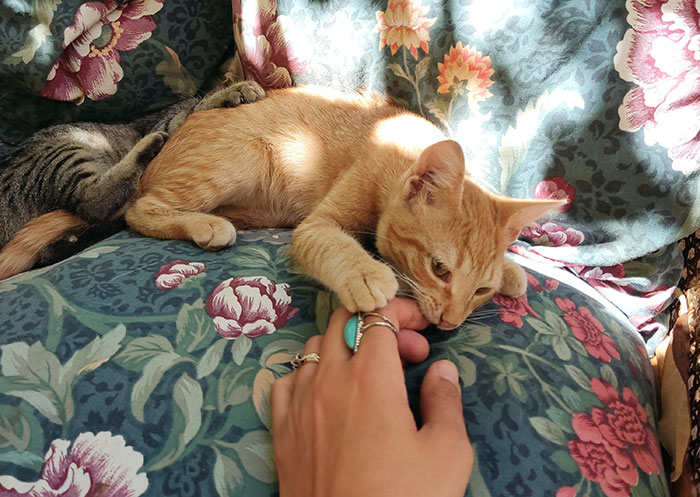You’re not alone if you’ve ever experienced your cat gnawing on your fingers. While it may seem like an odd behavior, there are several reasons why cats bless us with these love bites.
In this article, we’ll discuss 8 reasons why your finger is one of your cat’s favorite chew toys and how to get your cat to chew on something else.
HighlightsKittens chew fingers to soothe teething discomfort.Adult cats may nibble fingers as a form of play.Cats may bite to show affection through grooming behavior.Overstimulation can lead cats to lash out with nips.Cat bites can transfer harmful bacteria to humans.
The information provided herein is for informational purposes only. Please refer to ourdisclaimerfor more details..
Table of ContentsWhy does my cat want to chew on my fingers?Should I let my cat nibble on my hand?8 likely reasons your cat chews on your fingersYour cat is playingYour cat is teethingYour cat is overstimulatedYour cat is trying to groom youYour cat is bored or stressedYour cat was weaned too earlyYour cat has health issuesYour fingers smell or taste goodTips for redirecting this behaviorFrequently asked questionsWhat are cat love bites?Is finger chewing a sign of aggression in cats?
Why does my cat want to chew on my fingers?
Your cat may bite your fingers for many reasons, including play, stress, or even teething. Depending on your cat’s age, the reasons for its nipping behavior may vary.
Like human babies, kittens go through a teething process. During this period, they may exhibit behavior like biting your fingers. The sensation of chewing usually helps them work on their itching gums.

Should I let my cat nibble on my hand?
While your cat chewing your fingers may seem cute or harmless, you should discourage this behavior. Letting your cat chew on your fingers can teach your cat to do this continuously.
Your cat’s mouth could also harbor bacteria. According toHealthline, cat bites could introduce harmful bacteria like Streptococcus and Pasteurella. So, if your cat consistently bites you, it could transfer germs to you.

Image credit:Crina Doltu
To discourage your cat from biting, gently remove your hand and ignore your pet for a minute. This will help the cat understand that you don’t like the behavior. After a few minutes, you can restart the play session and deflect your cat’s attention onto a chew toy.
8 likely reasons your cat chews on your fingers
Your cat is playing
Even though our pets have been domesticated, they still have their hunting instincts. Cats usually chew on things during playtime to practice their hunting skills.
Play stimulates cats mentally and physically and acts as a way to interact with their owners or other cats. Your cat doesn’t want to hurt you, it’s just roughhousing.
Your cat is teething
A teething kitten will experience some form of discomfort when its teeth start to erupt. Like human babies, kittens chew on things, including your fingers, to massage their gums and soothe discomfort. If your little fur ball starts nipping at your fingers around this age, chances are, your kitten is teething.
Your cat is overstimulated
Overstimulation in cats occurs when the level of sensory interaction becomes too intense for the cat to handle comfortably. Many cat owners have experienced this before. One minute, you’re petting your cat happily; the next, your fingers are scratched or nipped at.
Overstimulation can cause cats to lash out during petting sessions in ways like biting your fingers. Other signs include dilated pupils,tail twitching, and flattened ears.
According to theHumane Society of Sonoma County, many cats tend to be sensitive on their stomach or paws and can reach their overstimulation threshold faster when being touched in those areas. So, don’t be surprised if your sweet little kitty nips at your fingers while you’re petting these areas. It’s nothing personal.
Your cat is trying to groom you

Image credit:Mikhail Nilov
Cats are affectionate animals with a grooming instinct. Grooming is a way they show affection, bond, and communicate. Your cat may like chewing on your fingers because they love you and are trying to mimic the grooming behavior they use with other cats. When cats nip at your fingers softly and then purr or cuddle with you, it’s okay – they’re trying to show you love.
Your cat is bored or stressed
Cats are intelligent animals who need adequate mental and physical stimulation. Just like humans, they do the most random things due to boredom. A bored cat may bite your fingers to get attention or to express their desire for play.
When cats feel stressed, they mightchew on or eat non-food itemsto comfort themselves. Environmental changes, new additions to the family, and changes in routine can all stress out your cat.
Your cat was weaned too early
Your cat has health issues
Health issues can cause a sudden change of behavior in cats. Dental issues, throat pain, and even neurological issues can cause a cat to nibble on your fingers. Cats with oral issues will often bite on their owners’ fingers because they are trying to relieve the discomfort or itchiness in their mouths.
Your fingers smell or taste good

Image credit:Zoi Gaitanarou
With more than 200 million scent receptors in their noses, cats have a pretty awesome sense of smell. So, if you notice your cat sniffing and nibbling at your fingers after dinner, it could be that your cat just couldn’t resist the tasty scent on your hands.
Tips for redirecting this behavior
If your cat loves to chew on your fingers, it could get a little uncomfortable and messy. Here are a few tips to ensure your cat doesn’t nibble on your fingers as much.
1.)Use toys to play with your cat instead of your hands. You could make use of feather wands or laser pointers.
2.)Do not allow your cat to keep biting you, no matter how gentle it seems. Instead, redirect your cat’s attention to something else when they bite.
3.)Provide a variety of toys that stimulate the cat’s senses. Toys with different textures, scents, and sounds can satisfy their curiosity. The possibilities are endless! You could give your cat a rawhide bone, a tough rubber toy, or a dental treat.
4.)A teething kitten needs a soft toy to chew on. These toys are designed to soothe their gums and allow them to chew safely. While some teething kittens prefer to chew cardboard, others like rubber toys.
5.)Watch your cat carefully during playtime to ensure they’re okay. If you think that your cat is overstimulated, give playtime a break.
6.)Identify stressors for your cat and create a safe environment.
7.)Learn to differentiate between playful and aggressive behavior. If play becomes too rough, stop the interaction and resume when the cat is calmer.
8.)If the behavior starts abruptly, consult a veterinarian or a behaviorist for help.
Frequently asked questions
What are cat love bites?
Cat love bites are gentle, playful nips that cats do to show affection during interactions with their owners.
Is finger chewing a sign of aggression in cats?
Finger chewing in cats is not necessarily a sign of aggression; it may indicate playful behavior, teething in kittens, or a form of curiosity. You need to assess the overall context, body language, and any accompanying behaviors to determine whether your cat is being aggressive or not.
Thanks! Check out the results:
3Kviews3Kviews
Pet Wellness